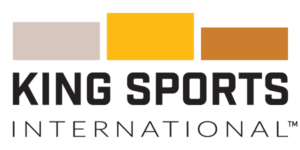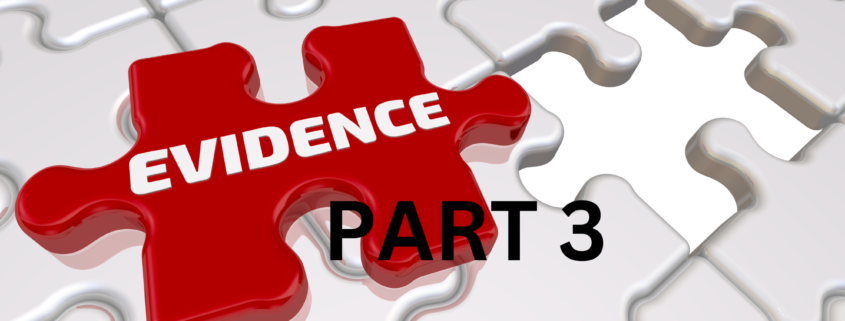Where’s the evidence?! Part 3 – Here’s the evidence
In Part 1 of this article series I shared my experiences in the field of paradigm shifting and some of the experiences I had. Not quite as fatal as the experience that the 19thCentury Hungarian doctor Ignaz Semmelweis paid. However still an eventful experience.
In Part 2 of this article series I discussed the meaning of the words ‘Where’s the evidence’, again making suggestions that may lead to further evoking of emotions!
In this article, Part 3 of the series, I want to provide some ‘evidence’ of why I said what I said in Part 2 – that the main reason those who lash out in response to my innovations demand to see the evidence is that they are confident there is no randomized double blind placebo controlled study that I can offer, and therefore are looking for the comfort of being ‘right’ enough to keep doing what they are currently doing.
My first point about this call for evidence is this – what percentage of their life actions that they make on a daily basis is based on randomized double blind placebo controlled studies? I suggest very little.
Do they select the mattress they sleep on based on a randomized double blind placebo controlled study? Maybe, but I doubt it. Is the way they lay oh the bed during the night based on a randomized double blind placebo controlled study? Maybe, but I doubt it.
Is the way the get out of bed in the morning based on a randomized double blind placebo controlled study? Maybe, but I doubt it. Is the hand they use (right or left) for personal hygiene in the morning based on a randomized double blind placebo controlled study? Maybe, but I doubt it.
Is the hand they use (right or left) to move food from their breakfast plate to their mouth based on a randomized double blind placebo controlled study? Maybe, but I doubt it. Is the hand they use to comb their hair or the type of comb they use based on a randomized double blind placebo controlled study? Maybe, but I doubt it.
I could go on, all day long…
Bottom line – how much of what you do all day is based on a based on a randomized double blind placebo controlled study?
Now let’s talk about training.
Is the way they warm up based on a randomized double blind placebo controlled study that shows that compared to all available options, that is the best way? Maybe, but I doubt it.
Are the exercises they choose based on a randomized double blind placebo controlled study that shows that compared to all available options, that is the best way? Maybe, but I doubt it.
Are the loading parameters – reps, speed of movement, number of sets, rest periods – based on a randomized double blind placebo controlled study that shows that compared to all available options, that is the best way? Maybe, but I doubt it.
Are the exercise technical models they employ – including width of grip and or stance, angle of grip or foot placement, line of movement etc. – based on a randomized double blind placebo controlled study that shows that compared to all available options, that is the best way? Maybe, but I doubt it.
Now you can tell me anything you want about how your program is 100% science based – but please, don’t assume me for a fool. I’ve been around the block a few times. And even in the last few days I’ve been privy to informal discussion between some of the leading US researchers who quite simply had two things in common – firstly, they could not reach a consensus as to the definitiveness of loading parameter for generic optimal muscle hypertrophy. And secondly, they all deferred to their own personal experiences to willingly over-ride the conclusions of one of their own groups recent research conclusions.
So let’s be straight – if a leading group of scientists cannot find consensus in the ‘science’ regarding one single training variable – your training decisions and program design is going to be more art than science.
Now, of course, if you want to abdicate the uniqueness of you as an individual to the average response of the short duration, small group sample in any given study conclusion – be my guest.
In summary, stop kidding yourself that all your training decisions are based on a randomized double blind placebo controlled studies! And stop cherry picking when you are ‘right’ or someone else is ‘wrong’ because of the absence or presence of a randomized double blind placebo controlled study.
Does this mean I am anti-science? Not at all. Does this mean that science in our field is useless? Not at all. It is however challenged. Challenged by the amount and complexity of physically training an individual, as opposed to the average of a specific sample group.
When I’m making a training decision for a 15 year veteran in a sport, attempting to make their third Olympics Games, where is the randomized double blind placebo controlled study that I will make my decisions based on with absolute certainty? For that matter, where is the randomized double blind placebo controlled study that involved a sample size of clones of your client, irrespective of what their demographic is?
Does that mean I am right about the innovations I share with the world? Not at all. Are the the honest reflections based on about as much empirical evidence I can apply? Are they the best way I have found to date based on my experience? Absolutely.
Now before I scuttle back into the woods to cover from the rounds fired by those inflamed by my audacity to suggest that science has yet definitively navigate program design for each and every person, allow me to share some food for thought about ‘science’.
Marcia Angell, who spent two decades as editor of The New England Journal of Medicine, wrote in 2009:
“It is simply no longer possible to believe much of the clinical research that is published, or to rely on the judgment of trusted physicians or authoritative medical guidelines. I take no pleasure in this conclusion, which I reached slowly and reluctantly over my two decades as editor of The New England Journal of Medicine”[1]
In 2015 Richard Horton, editor of The Lancet, wrote that
“The case against science is straightforward: much of the scientific literature, perhaps half, may simply be untrue. Afflicted by studies with small sample sizes, tiny effects, invalid exploratory analyses, and flagrant conflicts of interest, together with an obsession for pursuing fashionable trends of dubious importance, science has taken a turn towards darkness”[2]
Here’s a case study that I have watched with interest. I have worked with a number of Vietnam Veterans over the years. They complained about a thing they called ‘Agent Orange’. Heard of it? It was a chemical herbicide and defoliant was used to clear out tropical jungles in Vietnam during that conflict to expose the hiding places and food supplies of Viet Cong guerrilla fighters. According to an article in Natural News:
“In the years from 1961 to 1971, the American military sprayed roughly 12 million gallons of it across 30,000 miles in the southern part of Vietnam. Agent Orange contains the toxin dioxin, which has been linked to cancer, birth defects, and other fatal illnesses. Millions of the Vietnamese people are still suffering from the effects of exposure to the chemical.”[3]
Up until 11 August 2018, apparently “it was claimed at the time that there wasn’t enough evidence to link Agent Orange to health problems.” On 11 August 2018 a US High Court was convinced enough to award damages against the firm that makes this drug, Monsanto, of $289 million – for one victim in the US.
Now my question to those who hold or portray to hold the belief that they discard all unless a randomized double blind placebo controlled study supports – would you have backed your belief and be willing to be exposed to being sprayed by Round Up prior to 11 August 2018?
Yes, these statements and case study refer to medical research, not sports science research. However, I know of at least one study that didn’t even happen yet was published as if it did in a peer-reviewed journal…
Okay, maybe there’s been more than one, but I don’t want to burst your bubble all at once. After all, too many are still angry at me for my habit of presenting my evidence, based on at least a decade of observation and experimentation, and backed by four decades of observation and experimentation – that challenges most of what you have been led to believe, or had reached your own conclusion, was the best thing for you….
References
[1] Angell M. Drug Companies & Doctors: A Story of Corruption. The New York Review of Books magazine. [Last accessed August 5, 2015]. Available from: http://www.nybooks.com/articles/archives/2009/jan/15/drug-companies-doctorsa-story-of-corruption/ [Ref list]
[2]Horton R. Offline: What is medicine’s 5 sigma? [Last accessed August 5, 2015]. www.thelancet.com. Available from: http://www.thelancet.com/pdfs/journals/lancet/PIIS0140-6736%2815%2960696-1.pdf
[3] Z. Isabelle, 2018, Vietnam demands Monsanto pay hundreds of millions in damages to victims of Agent Orange, Natural news Tuesday, September 04, 2018. https://www.naturalnews.com/2018-09-04-vietnam-demands-monsanto-pay-hundreds-of-millions-in-damages-to-victims-of-roundup-glyphosate-weedkiller.html



